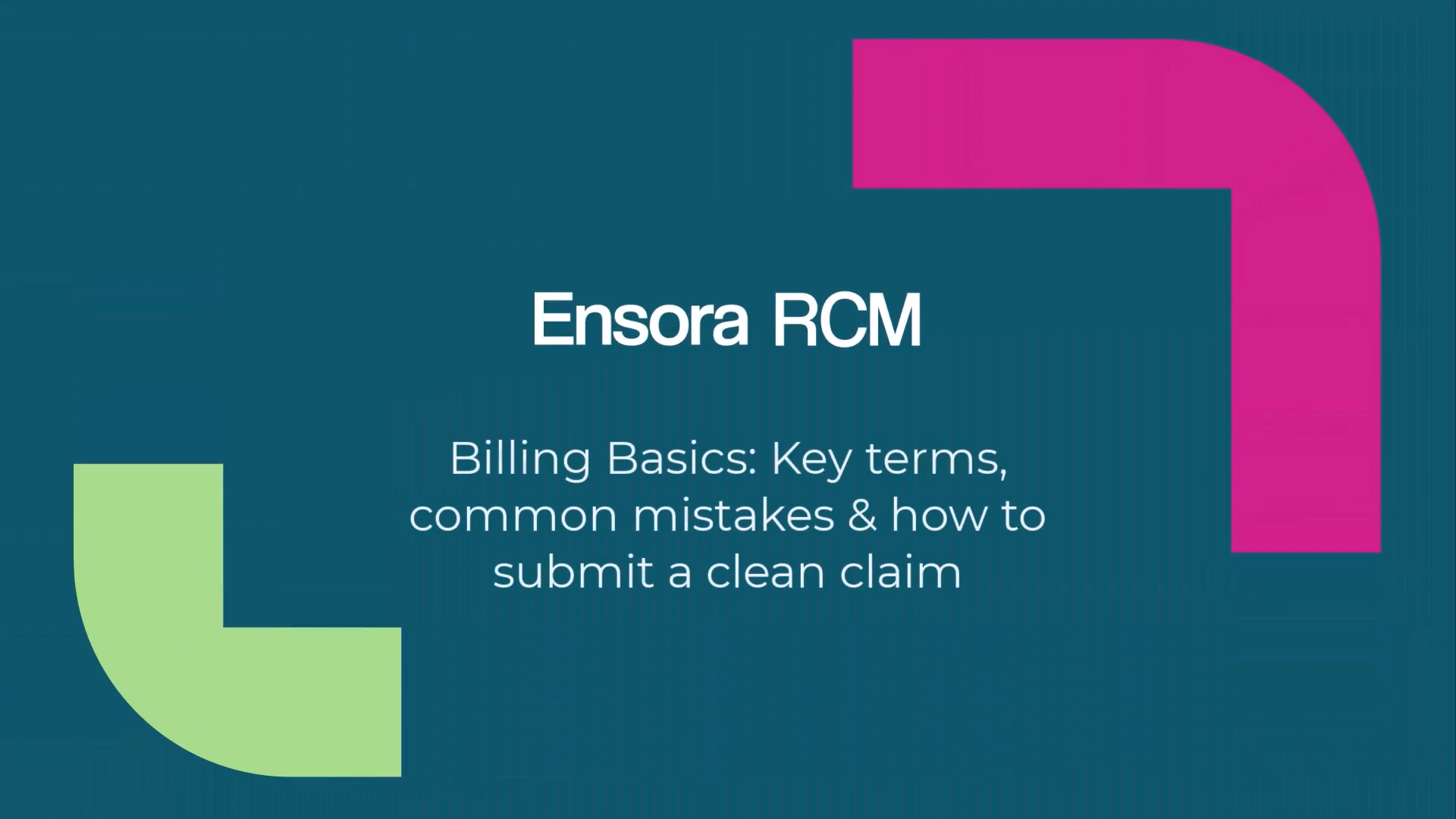Simple billing or full-scale RCM: Which is right for your therapy practice?

If you’re exploring billing options for your practice, you’ve probably considered two main approaches: simple billing solutions and full-scale revenue cycle management (RCM) services. While both handle money coming into your practice, they work very differently and serve different needs. This blog breaks down the key differences between these approaches, helping you make an informed decision that aligns with your practice’s size, complexity, and long-term goals.
What are simple billing solutions?
Simple billing solutions are tools or services that handle basic billing tasks for your practice. Think of them as the essential building blocks of billing — they get your claims submitted and help you track payments, but they don’t dive deep into the complexities of revenue optimization.
Key features of simple billing solutions
These systems typically include:
- Claim submission and tracking: Submit insurance claims electronically and monitor their status
- Basic accounts receivable management: Track outstanding balances and overdue accounts
- Payment posting: Record payments when they arrive
- Limited compliance support: Basic updates for coding changes, but minimal ongoing guidance
Advantages of simple billing solutions
- Cost-effective for smaller practices: If you’re a solo practitioner or small group with straightforward billing needs, simple solutions often come with lower upfront costs and monthly fees.
- Direct control over processes: You maintain complete oversight of your billing workflows, staffing decisions, and day-to-day operations. This transparency means you always know exactly what’s happening with your claims.
- Flexibility in workflows: You can customize processes to match your practice’s specific needs and preferences without having to adapt to the methods of an external service provider.
Disadvantages of simple billing solutions
- Significant time investment required: Your staff — likely including you — will spend considerable time managing billing tasks instead of focusing on client care. This time commitment often increases as your practice grows.
- Higher risk of costly errors: Without specialized billing expertise, coding mistakes, claim denials, and compliance issues become more likely. These errors can result in delayed payments or lost revenue.
- Limited scalability: As your practice expands, simple billing solutions often struggle to keep pace. You may find yourself needing additional staff or more sophisticated tools, which can quickly increase costs.
- Compliance challenges: Healthcare billing regulations change frequently, and staying current requires dedicated attention that many practice owners simply don’t have time for.
What is full-scale revenue cycle management?
Full-scale revenue cycle management takes a comprehensive approach to your practice’s financial health. Rather than just handling individual billing tasks, RCM services manage the entire journey from the moment a client receives treatment to when you receive final payment.
The three phases of revenue cycle management
- Pre-service phase: This includes client scheduling, intake processes, insurance benefit verification, and obtaining necessary pre-authorizations. Getting these elements right from the start prevents downstream billing problems.
- Time of service phase: During client appointments, accurate documentation, proper CPT code selection, and appropriate charge entry ensure claims will process smoothly later.
- Post-service phase: After services are rendered, this phase covers claim submission, denial management, payment posting, accounts receivable follow-up, and performance optimization.
Advantages of full-scale RCM services
- Access to specialized expertise: Experienced billing professionals handle your claims with deep knowledge of coding requirements, payer policies, and compliance regulations. This expertise typically results in higher claim acceptance rates.
- More time for client care: When billing responsibilities are handled by experts, you and your staff can focus on what you do best: providing quality therapy services to your clients.
- Cost-effectiveness at scale: While RCM services have monthly fees, they often cost less than maintaining an in-house billing team when you factor in salaries, benefits, training, and technology costs.
- Built-in scalability: RCM providers can easily adjust to fluctuations in your practice volume without requiring you to hire or lay off staff.
- Performance monitoring and optimization: Regular reviews of key metrics like unbilled charges, accounts receivable aging, and payment speed help identify opportunities for improvement.
Disadvantages of full-scale RCM services
- Reduced direct control: Delegating day-to-day billing decisions to your RCM provider might feel like a loss of control, but this can be mitigated by choosing a provider with a transparent process and regular reporting.
- Data security considerations: Sharing client information with an external vendor can raise security concerns. However, by selecting an RCM provider with strong security protocols, proven compliance with privacy regulations, and thorough vetting processes, you can ensure your data remains protected while benefiting from their services.
Key differences that matter for therapy practices
Understanding these core distinctions will help you evaluate which approach aligns better with your practice’s current situation and future goals.

Real-world insights from successful implementations
Children’s Therapy Centers faced a critical decision: stick with simple billing or adopt full-scale revenue cycle management. They chose RCM because they wanted more than just basic billing support—they needed a solution to streamline their entire administrative process and improve efficiency across the board. By partnering with Ensora Health, they not only reduced time spent on admin tasks but also unlocked the ability to focus more on what matters most: providing exceptional care for kids and their families. Here’s a real-life example of how Ensora Health helped them save time and work smarter:
- Streamlined implementation: Ensora Health simplified billing and onboarding for Children’s Therapy Center, optimizing systems and workflows within weeks.
- Dedicated support: Account managers resolved claim issues and handled billing concerns, allowing staff to focus on patient care.
- Performance monitoring: Regular reviews of metrics like unbilled charges and payment timelines helped optimize the revenue cycle and maintain cash flow.
- Proactive denial management: Ensora Health reduced denial rates by analyzing patterns, addressing issues, and preventing recurring problems.
Discover how Ensora Health transformed operations for the Children’s Therapy Center. Read the full case study here.
Choosing the right solution for your therapy practice
The decision between simple billing solutions and full-scale RCM services depends on several factors specific to your practice’s current situation and future goals.
When simple billing solutions make sense
- Small practice with straightforward needs: If you’re a solo practitioner or small group with simple billing requirements, basic solutions may provide adequate functionality at a lower cost.
- Dedicated in-house billing expertise: Practices with experienced billing staff who stay current with regulations and coding changes may successfully manage with simpler tools.
- Strong preference for direct control: Some practice owners prefer maintaining complete oversight of all business processes, including billing operations.
When full-scale RCM services are the better choice
- Growing practices with increasing complexity: As you add therapists, service types, or locations, billing complexity grows exponentially. RCM services scale with your practice.
- Struggles with uncollected revenue: If your practice consistently leaves money on the table through denied claims, slow collections, or compliance issues, professional RCM expertise can significantly improve performance.
- Limited time for billing management: When billing tasks consume too much of your time or your staff’s time, outsourcing these functions allows everyone to focus on their primary roles.
- Desire for performance optimization: Practices seeking to maximize revenue through data-driven insights and continuous process improvement benefit from RCM providers’ expertise and analytics capabilities.
Questions to ask yourself
Consider these questions as you evaluate your options:
- How much time does your team currently spend on billing-related tasks?
- What percentage of your claims are denied on first submission?
- How long does it typically take to collect payment after services are rendered?
- Are you confident in your team’s ability to stay current with billing regulations?
- What would your practice gain if billing tasks were handled by experts?
Check out this handy comparison of billing options!
Making your decision with confidence
Choosing between simple billing solutions and full-scale RCM services depends on your practice’s current needs, growth trajectory, and strategic priorities. Consider starting with an assessment of your current billing performance. Ensora Health offers a free billing check to analyze your data, identify areas for improvement, and calculate potential benefits.
Your therapy practice deserves a billing solution that enhances rather than hinders your success. By understanding the differences between simple billing solutions and full-scale RCM services, you can make an informed choice that supports both your financial health and your ability to provide excellent care to your clients.
Whether you choose simple billing solutions or full-scale RCM services, the most important factor is selecting a partner who understands the unique challenges therapy practices face and demonstrates a genuine commitment to your success. Your clients depend on you for quality care — make sure your billing solution supports that mission rather than detracting from it.






